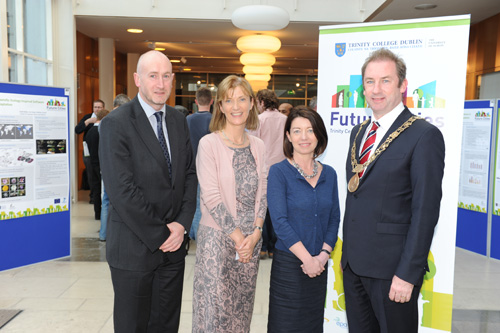Trinity Launches Multi-disciplinary Research Centre ‘Future Cities: Trinity Centre for Smart and Sustainable Cities’
Posted on: 08 July 2013
Future Cities, a new, multi-disciplinary research centre which will drive and inspire new ways of thinking about smart and sustainable cities was launched by the Lord Mayor of Dublin, Oisín Quinn at Trinity. Welcoming the initiative the Lord Mayor said: “There is a trend across the world towards cities. Successful cities are growing at a phenomenal rate. Dublin must do everything it can to position itself to be able to compete with other cities. I am very excited by this unique initiative to establish a Future Cities Centre in TCD. Many of the world’s leading new technology and social media companies have already chosen Dublin as their gateway to Europe”.
“If we want to compete in the global battle of cities, then Dublin is our only realistic chance. By international standards Dublin is a small to medium size city, yet it produces half of Ireland’s GDP. This unique combination of multi-disciplinary research activity working directly with industry, citizens and city agencies to achieve a city that is effective, efficient and sustainable, in which citizens are safe, productive, engaged and included can play a vital role in strengthening Dublin’s competitive advantages.”

Professor Vinny Cahill, Dean of Research, Professor Siobhan Clarke, Director of Future Cities, Professor Linda Hogan, Vice-Provost and the Lord Mayor of Dublin, Oisín Quinn
Commenting on the significance of the new Future Cities centre its Director, Professor Siobhan Clarke of the School of Computer Science and Statistics, emphasised the importance of research into smart and sustainable cities, referring to startling statistics which predict that up to 70% of the world’s population will be living in cities by 2050.
“The growth of cities is an evolving phenomenon that is often unplanned, leading to serious social problems. The breadth of research across Trinity College can be coalesced in a vision where we address the required optimisation of a city’s constrained resources, harness the growth potential for business, reduce the city’s environmental impact, and improve citizens’ quality of life within urban environments”, said Professor Clarke.
Dean of Research at Trinity, Professor Vinny Cahill noted that the new Future Cities centre represents an embodiment of the College’s research strategy, which is focused on tackling global challenges Trinity’s researchers can help to address while delivering social and economic value for Ireland.
Trinity’s Future Cities centre will uniquely include researchers from computer science, statistics, information systems, engineering, natural sciences, social science, chemistry, arts, nursing and midwifery, business and law. This inclusion of ‘hard’ and ‘soft’ sciences will facilitate the development of technology advancement and societal change leading to more sustainable and inclusive urban environments.
A dynamic workshop with representatives from 25 different companies and government agencies, the output of which will greatly inform the research agenda and priorities for the centre, took place immediately before the launch of Future Cities.
Professor Clarke explained that: “Our industry and agency relationships are crucial to allow us to identify industry and city needs, so that we can collaboratively set the research agenda for the Centre, and foster collaborative actions between industry, government agencies and academia”.
